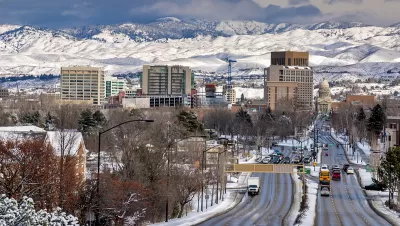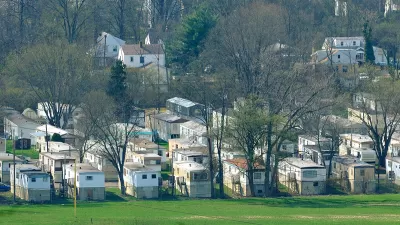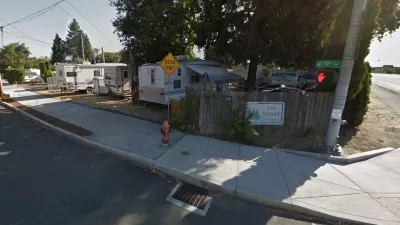The Boise City Council voted to make the purchase in a bid to protect residents from displacement.

To prevent low-income residents from being displaced by redevelopment, the Boise City Council is buying a manufactured home park, reports Margaret Carmel. City Council member Holli Woodings called the move an "immediate affordable housing project" that protects low-income households without building additional units. "It currently produces revenue in the way of rents from folks who already live there and it prevents dozens of people from immediate homelessness if this piece of property falls into private hands," said Woodings.
"The property will be purchased for $3.25 million from the Betts Family Trust." The lone dissenter on the council, Luci Willits, opposes the purchase on the grounds that it makes the city a landlord, but the article notes that Boise already owns and operates over 200 units of affordable housing. Willits also pointed out that buying the property removes it from the tax rolls, reducing property tax revenue. "This type of property tax shift does happen when certain properties are not taxed or have a cap on how much their bill can be, but it takes a large change to make noticeable impacts on Boise’s residential property taxpayers."
"City Council Member Patrick Bageant noted this in his comments in support of the purchase and called on the Idaho Legislature to make changes to the property tax formula to bring relief," adding that the city should also revise its zoning code to enable more housing construction.
FULL STORY: ‘Immediate affordable housing’

Planetizen Federal Action Tracker
A weekly monitor of how Trump’s orders and actions are impacting planners and planning in America.

Maui's Vacation Rental Debate Turns Ugly
Verbal attacks, misinformation campaigns and fistfights plague a high-stakes debate to convert thousands of vacation rentals into long-term housing.

Restaurant Patios Were a Pandemic Win — Why Were They so Hard to Keep?
Social distancing requirements and changes in travel patterns prompted cities to pilot new uses for street and sidewalk space. Then it got complicated.

In California Battle of Housing vs. Environment, Housing Just Won
A new state law significantly limits the power of CEQA, an environmental review law that served as a powerful tool for blocking new development.

Boulder Eliminates Parking Minimums Citywide
Officials estimate the cost of building a single underground parking space at up to $100,000.

Orange County, Florida Adopts Largest US “Sprawl Repair” Code
The ‘Orange Code’ seeks to rectify decades of sprawl-inducing, car-oriented development.
Urban Design for Planners 1: Software Tools
This six-course series explores essential urban design concepts using open source software and equips planners with the tools they need to participate fully in the urban design process.
Planning for Universal Design
Learn the tools for implementing Universal Design in planning regulations.
Heyer Gruel & Associates PA
JM Goldson LLC
Custer County Colorado
City of Camden Redevelopment Agency
City of Astoria
Transportation Research & Education Center (TREC) at Portland State University
Jefferson Parish Government
Camden Redevelopment Agency
City of Claremont





























